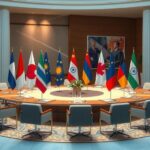U.S. and Russian Negotiators Convene Ceasefire Talks in Saudi Arabia
U.S. and Russian negotiators have initiated talks in Saudi Arabia regarding a partial ceasefire in Ukraine, following earlier discussions between U.S. and Ukrainian delegations. Despite an agreement in principle, differing interpretations of ceasefire terms and ongoing military actions complicate the situation. Ukraine seeks broader protections beyond just energy facilities, while Russia maintains a narrower focus. Cyber and drone assaults persist as the conflict continues.
On Monday, U.S. and Russian negotiators commenced discussions in Riyadh, Saudi Arabia, focusing on a potential partial ceasefire in Ukraine. This meeting followed prior negotiations involving U.S. and Ukrainian delegations to outline the specifics of pausing long-range assaults by both Russia and Ukraine on energy facilities and civilian infrastructure. Furthermore, they seek to establish safety protocols for shipping in the Black Sea.
The agreement for a limited ceasefire was reportedly reached after discussions between U.S. President Donald Trump and the leaders of Ukraine and Russia. However, both parties currently present differing interpretations regarding which targets would be exempt from attacks, leading to mutual accusations of undermining the ceasefire efforts. The White House has indicated that the agreement encompasses “energy and infrastructure,” while the Kremlin construes it more narrowly, only addressing “energy infrastructure.” Ukrainian President Volodymyr Zelenskyy has articulated a broader desire for the protection of railways and ports as well.
Kremlin spokesman Dmitry Peskov emphasized that the accord pertains solely to energy facilities and asserted that the Russian military is carrying out President Putin’s directive to pause such attacks for 30 days. Meanwhile, Peskov accused Ukraine of sabotaging the ceasefire following an attack on a gas metering station in Sudzha, a claim that Ukrainian military officials have strongly denied, directing blame back at Russian forces.
As the negotiations for a ceasefire continued, Russia intensified its military actions, deploying a significant number of drones against Ukraine, resulting in several casualties, including a father and his young daughter in Kyiv. President Zelenskyy highlighted the urgency for a ceasefire proposal initiated on March 11, contending that ongoing attacks were exacerbating the situation and calling for increased international pressure on Russia to cease hostilities.
Zelenskyy has reiterated Ukraine’s receptiveness to a 30-day ceasefire as suggested by Trump, though President Putin’s conditions—including cessation of arms supplies and military mobilization—remain unacceptable to Ukraine and its allies. Steve Witkoff, Trump’s special envoy, expressed optimism regarding potential progress from the talks, particularly concerning a ceasefire in the Black Sea region.
In parallel, Zelenskyy reported that the latest U.S.-Ukrainian discussions were more technical in nature, involving members of Ukraine’s military and energy sectors. He praised the constructive atmosphere of the negotiations but stressed the necessity for Putin to issue a definitive order to halt the attacks, emphasizing that resolution necessitates action from the party responsible for initiating the conflict.
Additionally, on Sunday, Ukrzaliznytsia, Ukraine’s state railway operator, experienced a substantial cyber attack on its online platforms, which did not disrupt train operations but hindered online ticket purchases. As of Monday, efforts to restore full functionality of the systems were underway.
The Ukrainian air force reported that Russian forces launched 99 drones into Ukraine, of which, several were intercepted, while others inflicted damage across multiple regions. Incidents included residential areas being struck, resulting in injuries to civilians in Kyiv and Kharkiv, as well as damage to local residences in Zaporizhzhia.
In conclusion, the negotiations between U.S. and Russian officials in Saudi Arabia aim to establish a partial ceasefire in Ukraine amid ongoing military actions and differing interpretations of the ceasefire terms. Increased international pressure and clear communication from Russian leadership are crucial to facilitate peace efforts. Simultaneously, Ukraine continues to face cyber and military attacks, underscoring the urgent need for a collaborative resolution to the ongoing conflict.
Original Source: www.mymotherlode.com








Post Comment